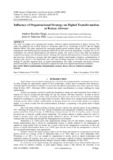| dc.contributor.author | Njagi, A. B. | |
| dc.contributor.author | Ndavula, John O. | |
| dc.date.accessioned | 2021-04-26T15:13:36Z | |
| dc.date.available | 2021-04-26T15:13:36Z | |
| dc.date.issued | 2020-10 | |
| dc.identifier.citation | IOSR Journal of Humanities And Social Science (IOSR-JHSS) Volume 25, Issue 10, Series 7 (October. 2020) 48-59 | en_US |
| dc.identifier.issn | 2279-0845. | |
| dc.identifier.issn | 2279-0837 | |
| dc.identifier.uri | https://www.iosrjournals.org/iosr-jhss/papers/Vol.25-Issue10/Series-7/H2510074859.pdf | |
| dc.identifier.uri | http://hdl.handle.net/123456789/4600 | |
| dc.description.abstract | The study investigates how organisational strategy influences digital transformation of Kenya Airways. The study was guided by the Unified Theory of Acceptance and Use of Technology (UTAUT) and the Digital Maturity Model. The study employed the convergent parallel mixed methods design. The study targeted 410 management staff holding positions designated Grade H11 to H15 across the departments. A sample size of 157 respondents was selected. Questionnaires and interview guides were used to collect data. Data was analysed using both descriptive and inferential statistics. Findings also indicated that digitization of customer touch points and processes, developing a strategic plan that supports digital transformation initiatives, communication of Strategic plan targets to all departments and staff, and providing budgetary flexibilities that accommodate shifting IT priorities impacted most on digital transformation. The study recommends that Kenya Airways should ensure there is a department dedicated to support the staff on the digital transformation initiatives. | en_US |
| dc.language.iso | en | en_US |
| dc.subject | Digital transformation, Organisational strategy, Kenya Airways, Digital technologies, Culture | en_US |
| dc.title | Influence of Organisational Strategy on Digital Transformation at Kenya Airways | en_US |
| dc.type | Article | en_US |

